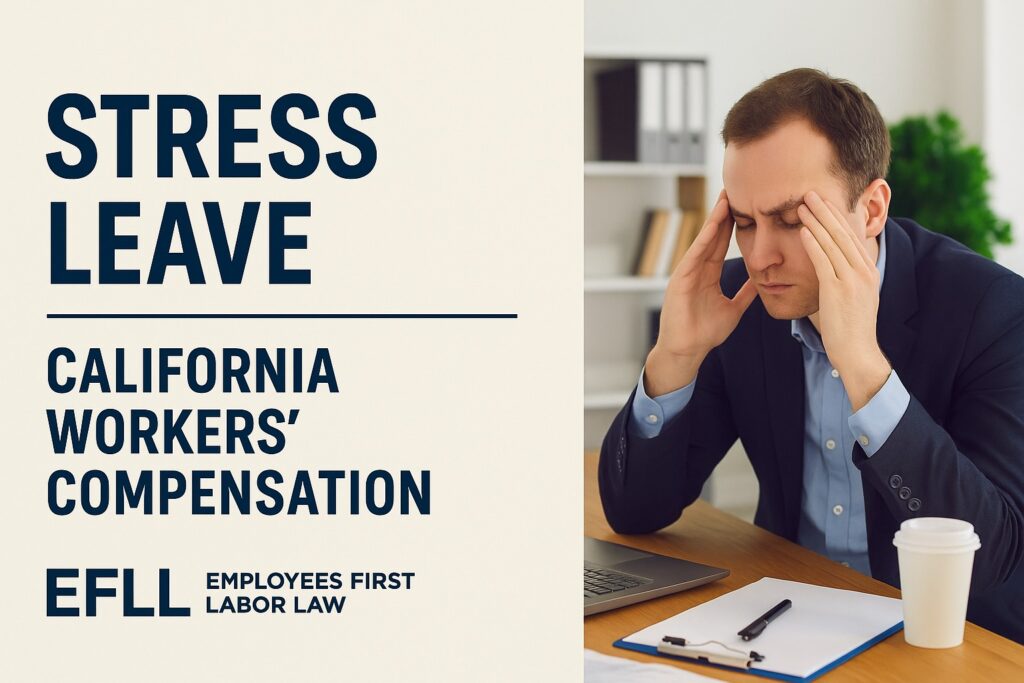
Feeling mentally exhausted by work? You’re not alone. California law recognizes that severe workplace stress can cause legitimate, compensable injuries — but navigating a psychiatric or stress-related claim is uniquely challenging. Below is the Employees First Labor Law (EFLL) playbook for understanding, filing, and winning stress-leave workers’ comp cases in 2025.
1. What Counts as “Stress Leave” Under Workers’ Comp?
“Stress leave” refers to time off work taken because psychological or emotional strain has become a disabling condition. In the comp system this is called a psychiatric injury (Cal. Lab. Code § 3208.3). To qualify, the mental condition must:
- Be diagnosed by a licensed physician or psychologist under DSM-5 criteria.
- Cause disability or need for medical treatment.
- Be at least 51 % caused by actual events of employment (the “predominant cause” test).
- Result from events of employment lasting six months or more (unless it’s a “sudden and extraordinary” event like a violent robbery).
Example: A call-center rep develops debilitating anxiety after 14 months of constant verbal abuse from customers and unrealistic performance metrics.
2. Common Work Stressors That Trigger Claims
- Excessive workload & understaffing
- Bullying, harassment, or discrimination
- Witnessing workplace violence or traumatic accidents
- Unfair discipline or demotion
- Fear of retaliation for whistleblowing or reporting safety issues
3. How to File a Stress-Related Claim
| Step | What to Do | Practical Tips |
|---|---|---|
| 1. Report ASAP | File a DWC-1 with HR or your supervisor the moment you realize stress is disabling you. | Document date, time, and to whom you reported. |
| 2. Seek Medical Help | Get evaluated by a mental-health professional immediately. | Ask for a detailed work-related stress note. |
| 3. Keep Evidence | Save emails, performance reviews, memos, and witness statements. | Create a stress journal noting triggering events. |
| 4. Consult Counsel | Psychiatric claims face aggressive employer defenses—legal help is essential. | EFLL offers free consultations. |
Need a refresher on the basics? Read our guide on How to File a California Workers’ Comp Claim.
4. Benefits Available on Stress Leave
- Temporary Disability (TD): Usually two-thirds of gross wages while you’re off work.
- Medical Treatment: Therapy, medication, hospitalization, and related costs.
- Permanent Disability (PD): If your condition causes lasting impairment.
- Supplemental Job Displacement Voucher: If you can’t return to your usual job duties.
- Possible CFRA/FMLA Overlap: Up to 12 weeks of job-protected leave may coincide with comp TD.
Learn more about the difference between TD vs. PD benefits.
5. Employer & Insurance Company Defenses (and How We Counter Them)
| Defense | Carrier’s Playbook | EFLL Counter-Strategy |
|---|---|---|
| “Good-Faith Personnel Action” | Discipline, demotion, or transfer was lawful, so no comp liability. | Show that action was retaliatory, excessive, or not the predominant cause. |
| “Predominant Cause Not Work-Related” | Blame divorce, finances, or prior mental illness. | Obtain treating-doctor opinion, subpoena therapy records only if helpful, produce co-worker statements. |
| “Late Filing” | Claim wasn’t reported within 30 days. | Use cumulative-trauma theory; argue ignorance of psychiatric nature delayed reporting. |
6. Tips to Strengthen Your Stress-Leave Case
- Document Everything — objective proof beats “he-said-she-said.”
- Follow Medical Advice — gaps in treatment weaken credibility.
- Avoid Social Media Missteps — photos of vacations or parties can be twisted against you.
- Stay Consistent — your story to HR, doctors, and the insurer must align.
- Retain Experienced Counsel Early — psychiatric claims are denied far more often than physical-injury claims.
7. How EFLL Fights for Stressed-Out Workers
At EFLL, our dedicated team:
- Coordinates psychiatric evaluations with compassionate, claimant-oriented doctors.
- Builds timelines that tie workplace events to your diagnosis.
- Deposes HR, supervisors, and co-workers to expose toxic practices.
- Negotiates maximum settlements or pursues trial when insurers low-ball.
- Integrates related claims like Retaliation for Requesting CFRA Leave or Whistleblower Protections.
We’ve recovered over $17 million in benefits and settlements for California employees facing overwhelming job stress.
8. Ready to Take Back Control?
You deserve a workplace that protects your mental as well as physical health. If job stress has pushed you to the breaking point, contact Employees First Labor Law today for a free, confidential consultation.
📩 Schedule a consultation
📞 Call us now to speak with a workers’ comp attorney



